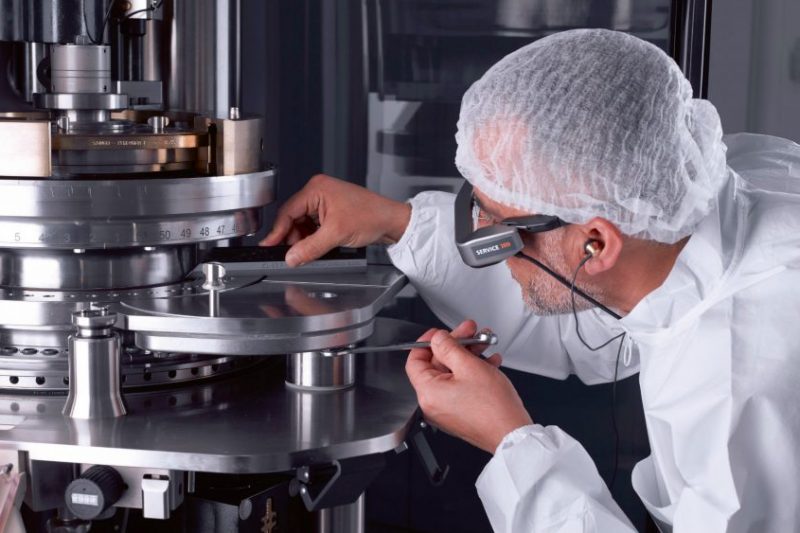Creating the factories of the future

As turnkey production lines are increasingly updated with cutting-edge technologies in mind, from augmented reality (AR) and VR solutions to industry 4.0 solutions, confectionery and chocolate manufacturers are gearing up for the factory of the future. Daisy Phillipson reports for Confectionery Production
Intelligent robots, computerised eyewear, augmented reality – a couple of decades ago, these futuristic concepts were only familiar in the realm of science fiction. However, in the wake of the technological revolution, the food industry continues to embrace the emerging transformation.
When it comes to turnkey lines for bakery and confectionery applications, a number of innovative updates on existing models pose a myriad of benefits, from optimising productivity, increasing flexibility, adapting to trends, reducing waste and costs and offering opportunities to small and mid-sized businesses, as well those in developing markets.
The implementation of pioneering technology and digitally connected industry 4.0 machinery has been more of an evolution than a revolution, as developers gradually yet continually move towards creating systems containing intelligent components. However, the idea of a smart factory is certainly gaining ground across the globe.
In data we trust
One company that recognised the need for greater line efficiencies and less dependence on manual intervention and operator skills some time ago is tna, leading supplier of turnkey processing and packaging solutions.
The organisation recently launched an integrated data management tool to help manufacturers gain more and better insights into their processes. With the new tna intelli-sys iPS 3 software, food producers will be able to use a single, standardised platform to collate, visualise and evaluate live and historical information from every part of the production chain and across multiple locations.
By integrating data from every step and at every site in a single plant management system, the technology has been designed to help increase visibility, reduce administrative tasks and improve traceability, resulting in a smarter, more transparent and ultimately more profitable manufacturing operation.
“Thanks to the system’s real-time data acquisition capabilities, faults are detected much more quickly than humanly possible,” explains tna CEO Jonathan Rankin, “ensuring downtime and waste are kept to an absolute minimum, while food safety and product quality are maintained at all times.”
Virtual reality
Rankin went on to describe how digitisation of the food sector will also play an important role when it comes to project management services, adding the potential for virtual reality in demonstrating the capabilities of a turnkey facility.
For example, using software like Factory Design Suite, tna is able to create a 3D model of a customer’s factory in a virtual environment to give a real understanding of its complete potential in an environment that is familiar to them.
“This not only saves installation time, but also provides the customer with total investment security, as we’ll be able to make any necessary modifications before the systems are installed,” adds Rankin. “As Industry 4.0 is spreading, virtual modelling is likely to become a very common practice across the sector.”
Packaging pioneers
The latest generation of turnkey packaging solutions are also being developed by suppliers such as industry experts Ilapak, who recently introduced the Delta Systems Raptor – the first robotic flow wrapping system to operate via a common control platform for both robot and wrapper.
“Our engineers have succeeded in integrating the robot controls within the wrapper, so rather than having two ‘brains’ controlling different parts of the process, the entire line is controlled by one ‘brain’,” explains Ilapak’s Chris Gee.
In addition to the cost-saving benefits of the line being controlled by one ‘brain’, the Raptor is also the first system in the company’s portfolio to offer augmented reality features for troubleshooting and preventative maintenance.
“We are seeing cost of ownership reductions in the order of 20-25 per cent versus comparable systems,” adds Gee. “This makes the Raptor a very attractive option for biscuit, bar and chocolate manufacturers looking to invest in a future-proof line that combines reliable, high-speed operation with low running costs and the latest hi-tech features such as augmented reality.”
Through the looking glass
When discussing the influx of futuristic tools that present an array of new possibilities for food processing businesses, another solid example is GEA’s groundbreaking Remote Eye Wear, which offers virtual real-time support by a GEA service technician via remote access.
The cutting-edge technology provides a wide range of bidirectional functions such as ‘listening’, ‘speaking’ or ‘chatting’ thanks to its integrated high resolution camera and reliable microphone. By projecting images onto the GEA Remote Eye Wear screen, it is also possible to carry out repairs, process optimisations or inspections at internet speed. Another company to weigh in on the future of food production technology is Bühler, which has introduced its very own Smart Glasses to remotely guide on-site technicians through repairs and therefore save time and costs.
When a customer puts on these special glasses, their view is transmitted to a screen. The technician can then support and instruct the client quickly and inexpensively, solving the problem by guiding through repairs. Based on an augmented reality solution and device, these Smart Glasses make a completely new way of servicing machines and equipment possible.
Around the world
Thanks to the rise of technology and the internet, the application and maintenance of full processing lines makes it possible for turnkey suppliers to manage complex global supply chains and adapt to changing consumer demands.
This is certainly the case for Mecatherm, which recently installed the first ever factory for industrial bread production in Angola after it was requested by Dismassaba-Le Comptoir d’Export group. The aim of the project is to deliver bread of a consistent quality while meeting the highest international standards in terms of food health and safety, in order to work towards food independence in Angola. It is just one example of how the move towards digitalisation and innovation means suppliers are able to deliver, install and maintain advanced and complete lines for quality-minded manufacturers worldwide.
As chocolate and confectionery companies continue to innovate, diversify and embrace new technologies and processes, the food industry looks set to continue its shift towards the smart factory model and all the benefits that come with it.



